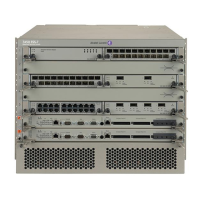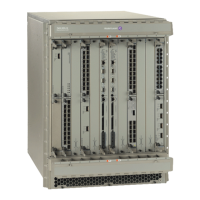IP Router Configuration
Router Configuration Guide 31
• Expanded addressing capabilities — IPv6 increases the IP address size from 32 bits
(IPv4) to 128 bits, to support more levels of addressing hierarchy, a much greater
number of addressable nodes, and simpler auto-configuration of addresses. The
scalability of multicast routing is improved by adding a scope field to multicast
addresses. Also, a new type of address called an anycast address is defined that is
used to send a packet to any one of a group of nodes.
• Header format simplification — Some IPv4 header fields have been dropped or made
optional to reduce the common-case processing cost of packet handling and to limit
the bandwidth cost of the IPv6 header.
• Improved support for extensions and options — Changes in the way IP header
options are encoded allows for more efficient forwarding, less stringent limits on the
length of options, and greater flexibility for introducing new options in the future.
• Flow labeling capability — The capability to enable the labeling of packets
belonging to particular traffic flows for which the sender requests special handling,
such as non-default quality of service or “real-time” service was added in IPv6.
• Authentication and privacy capabilities — Extensions to support authentication, data
integrity, and (optional) data confidentiality are specified for IPv6.
Figure 3: IPv6 Header Format
al_0892
Version Prio. Flow Label
Payload Length Next Header Hop Limit
Source Address
Destination Address
Table 3: IPv6 Header Field Descriptions
Field Description
Version 4-bit Internet Protocol version number = 6.
Prio. 4-bit priority value.
